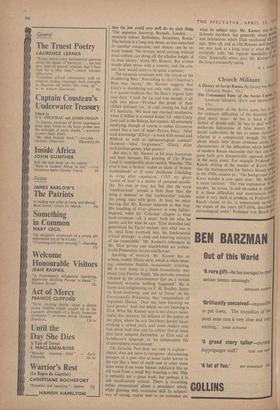This or such was Possum's way
The Invisible Poet: T. S. Eliot. By Hugh Kenner. (W. H. Allen, 30s.) THIS, we know, is an age of criticism. And the criticism is in its old age, chiefly the wisdom of prematurely old dons thinking themselves new critics. Mr. Kenner planned a book on Eliot in 1949 but didn't write it. A book on Eliot in 1959, tc be even readable. would have to be very dif- ferent from ,what has gone before. Mr. Kenner's often is. It contains pages which actually revive those innocent excited schooldays when one read Eliot for the first time, without benefit of com- mentary, since that 'whole smokeless industry' (as Mr. Kenner calls it, perhaps mistaking his adjective) was hardly founded.
Sometimes, though, The Invisible Poet is nut different---only the same but more so. On the `History' passage of Gerontion this is certainly the case: 'something she gives too soon into weak hands is refused, and in consequence of the re- fusal there is a propagation : in this phantom world contraceptives and rejected opportunities usurp one another's negative functions.' As Mr. Kenner slips smoothly and elegantly along the `vaginal' corridors of the poem one hopes desperately that Robert Graves will pop up and ask again why `jew' is written with a small initial letter. Mr. Kenner doesn't ask awkward ques- tions. 'The Jew who was spawned in some esta- minet of Antwerp,' he tells us, 'cannot but pro- long into the present the reputation of another who was born in a different inn.' I should say
that the jew could very well do no such thing. `The sequence Antwerp, Brussels, London . . . remotely echoes Bethlehem, Jerusalem, Rome.' The bottom is a long way down, as was remarked in another connection, and remote can be re- mote indeed. 'No written word moving without local context can shrug off the allusive weight of its own history,' states Mr. Kenner. But written words often move with a context, and the con- text here would seem to be quite continent.
The sexegesis continues with 'the circuit of the shuddering Bear.' Reminding us that Chapman's Bear was 'snowy,' Mr. Kenner suggests that Eliot's is shuddering not only with cold: 'there is a quaint tradition that the Bear's orgasm lasts nine days.' I took the tip, and true enough, it all falls into place—'Protract the profit of their chilled delirium' (or, 'A cold coming we had of it). Similarly, 'We have not reached conclusion, when I/Stiffen in a rented house' (cf. what Crazy Jane said to the Bishop, last stanza). All extremely satisfying, though of course it makes Gerontion sound like a sort of super Peyton Place. 'After such knowledge' (Eliot)—`a word with sexual and Biblical as well as epistemological contexts' (Kenner)—'what forgiveness?' (Eliot). After such parlour games, what poetry?
But that is Mr. Kenner at his least humorous and least humane. His glossing of The Waste Land is considerably more tactful. Whether The river's tent is broken' makes us think of 'broken maidenheads' or of some deciduous ('shedding its wings after copulation,' COD, my gloss) `tunnel of love' is a matter of personal sensibi- lity. We may or may not feel that the word 'combinations' sounds a little finer than the thing it denotes' or that 'carbuncular' touches the young man with glory. At least we enjoy hearing that Mr. Kenner responds in that way. His handling of Four Quartets is even lighter- fingered, while the 'Criticism' chapter is what book-reviewers call 'a must,' both for what he quotes and for what he says. 'Eliot extended and generalised his Egoist manner into what was to be, until fame overtook him, his fundamental critical strategy: a close and knowing mimicry of the respectable.' Mr. Kenner's references to Mr. Eliot private and unpublished are authen- tically Possumistic in tone and flavour.
Speaking of mimicry. Mr. Kenner has an urbane, mobile, Eliotic style, which is often amus- ing, sometimes fruitful, occasionally irritating. He is very funny in a fresh transatlantic way about Guy Fawkes Night, 'this patriotic emotion released by the circumstances that on a certain historical occasion nothing happened.' He is funny and enlightening on F. H. Bradley, funny on book-reviewing, and not so funny on the Encyclopiedia Britannica, that 'compendium of organised illusion.' Dear me, how knowing we have grown! And that which we are knowing is Eliot. What Mr. Kenner says is not always mean- ingful (for instance, his defence of the poetry of the plays, where he acts the 'clever lawyer hood- winking a cowed jury), and some readers may feel about both him and his subject that at times they have adapted themselves, as Eliot said of Swinburne's language, to 'an independent life of atmospheric nourishment.'
The Invisible Poet does not seek to explain— indeed, does not seem to recognise—the amazing paradox of a poet who at times looks horror in the eye like a hero of myth and at other times shies away from some human indelicacy like an old maid from a small boy watering a tree. This is certainly not a pious book, but perhaps it is still insufficiently critical. There is something rather emasculated about a procedure which, while glossing with enormous skill its subject's way of saying, makes next to no comment on what its subject says. Mr. Kenner can be d: liciously mordant, but generally about perscrig and institutions which Eliot swallowed uP ,, ago. After all, and as Old Possum well knils'ib cat may look at a king, even at what the of truthfully calls 'the regnant sensibility 01 :'1e, time.' Especially when, pace Mr. Kenner s the king is eminently visible.











































 Previous page
Previous page